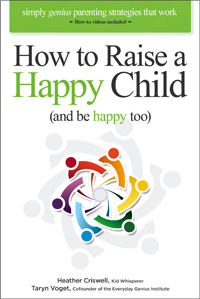Local Authors Find Time for Deep Thought in a Distracted WorldHow does a nonprofessional writer find the quality and quantity of quiet and contemplative time needed to create a meaningful book? Professional writers’ lives are structured around writing; however, nonprofessional writers may have to work on their book-writing projects while doing many other things at home or while at another job. As an editor and a book designer, I often see my clients navigate the challenges of making their dreams come true when creating their books, and the coauthors of How to Raise a Happy Child (and be happy too) are no exception. While working on this book for almost a year and a half, Taryn Voget — chief executive officer and cofounder of the Everyday Genius Institute — made many choices about her social life and business. Large chunks of time were dedicated to editing and thinking about what she wanted to say and how she wanted to say it. The process of researching, synthesizing the information, organizing the outline, putting the puzzle pieces together in a compelling way, writing, editing, and then creating a finished piece was a major commitment. “The finished product is so much better than I ever hoped,” says Voget. “At the same time, so much of life passed me by as I was in the cocoon of the book-making process. To create something important, I had to commit myself fully and let many other things go. The feedback from the book has been overwhelmingly positive, so I feel that it was time well spent. To help just one family makes it all worthwhile.” |
After 25 years of working with over 30,000 kids, Heather Criswell, who has been referred to as a “kid whisperer,” is the founder of WiseInside. She coauthored How to Raise a Happy Child (and be happy too), which presents her unique approach to parenting. “When I thought about writing a book,” Criswell says, “it seemed like some fairly easy tasks: set my schedule, commit to the required time and finish in a couple of weeks. I quickly realized that in order to write an amazing book, I had to be in an amazing zone of passion, concentration, enthusiasm and purpose. I learned that a schedule would never work because inspiration was the main ingredient to success. If I lacked inspiration and felt guilty, distracted or hungry, I would never produce the material; if I forced the writing, the work would reflect it.” “I also had to be willing to let go of other commitments when I was in this zone,” Criswell continues. “When I was ‘on a roll,’ I would be at my computer for 14 to 16 hours at a time with only bathroom and tea breaks. I had to honor my inspiration in the moment and keep the information moving out of my mind, body and spirit and onto the page.” Criswell learned to listen to her inner voice, which she describes as “the wisdom within all of us.” She was reminded that her messages are important and that she has the courage to continue the process — even with all of the challenges that present themselves. “It felt amazing to write the last chapter of the book and send it to the editor,” Criswell concludes. “Then, it felt amazing to get a final copy in my hand. The experience of writing a book has made me a better person, and I hope it will help millions of people around the world feel good!” © 2013 Joanne Shwed Originally written for CoastViews magazine Click here to see our page design sample. |




























